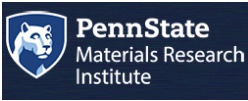“We want to be a partner with our vendor and based on the depth of interaction provided during the evaluation process, we were convinced that XENOCS is able and willing to provide that deeper relationship.”
Nichole M. Wonderling
Materials Characterization Laboratory, The Pennsylvania State University
November 4, 2016
The Materials Characterization lab at the Pennsylvania State University’s Materials Research Institute recently purchased a Xeuss 2.0 HR SAXS/WAXS system equipped with a Pilatus3 200K detector and SWAXS module to replace their current X-ray scattering instrument installed ten years ago.
The instrument will be used to expand the characterization capabilities of the lab, in particular for grazing incidence applications (GISAXS/GIWAXS), 2D WAXS measurements and simultaneous SAXS/WAXS measurements during dynamic studies, using shear or temperature cells. Such features will be especially useful for the study of organo-photovoltaic thin film structural characterization, polymer crystallization, block copolymer composites, ionic and conjugated polymers, rheo-SAXS, bio-synthetic hybrid materials and ultimately biological samples in solutions.
X-ray Scattering Manager Nichole Wonderling explains the reasons for their choice.
“The Xeuss 2.0 was selected for a variety of reasons. The first, and perhaps one of the most important reasons, was the uncomparable amount of effort that XENOCS put into demonstrating the capability of the instrument and the scientists behind the instrument. The process began more than one year prior to purchase with XENOCS measuring a number of samples and then presenting the results to our faculty and students. The time dedicated to both obtaining the highest quality results possible and to presenting those results was unprecedented. We were impressed from this point forward.
The reason for this is that our laboratory is looking for more than the typical vendor-customer relationship. We want to be a partner with our vendor and based on the depth of interaction provided during the evaluation process, we were convinced that XENOCS is able and willing to provide that deeper relationship. We look forward to continuing and developing that relationship once the instrument is on site.
A second reason is generation of high accuracy data in absolute intensity measurement in an automated fashion. Our previous system required a processing routine for every sample to convert the data to absolute intensity values which consumed valuable analyst time. Additionally, the promised high resolution mapping capability (down to less than 200 microns) will offer substantial benefit to our researchers that are working in the area of plastic engineering and production. Finally, competitive pricing was highly significant.
All of these features, when combined, make the Xeuss 2.0 the logical choice for our laboratory. We anxiously await its’ arrival so that we can begin a new chapter of SAXS measurements at The Pennsylvania State University.”
About the Materials Characterization lab at Penn State Materials Research Institute
The Materials Characterization Laboratory (MCL) at The Pennsylvania State University (Penn State) is an intense, fast paced user facility that annually serves just under 1000 researchers. The team consists of more than 20 scientists leveraging state-of –the-art characterization equipment and infrastructure in the Millennium Science Complex – a 275,600 square-foot science building housing two of the University’s premier research organizations – the Materials Research Institute and The Huck Institutes for the Life Sciences. The team works to find answers to complex questions and problems by providing an understanding of how microstructural and chemical characteristics dictate material performance. Charged with enabling research and educating the next generation of highly qualified researchers, the lab strives to produce both cutting edge research and top notch graduates.
The X-ray Scattering Laboratory is the primary source for X-ray diffraction at Penn State. Led by staff scientist Nichole Wonderling, the lab serves a wide array of disciplines from materials science to geoscience to food science and everything in between. The facility offers quantitative X-ray diffraction analyses, micro-focus diffraction, high resolution diffraction, small angle X-ray scattering, non-ambient capabilities, and a variety of related techniques.
For more information please visit https://www.mri.psu.edu/materials-characterization-lab
Contact : [email protected]


































